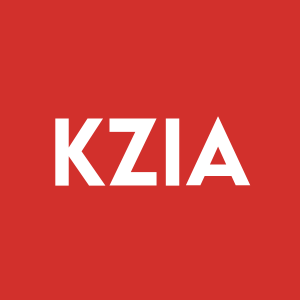Welcome to our dedicated page for Kazia Therapeuti news (Ticker: KZIA), a resource for investors and traders seeking the latest updates and insights on Kazia Therapeuti stock.
Kazia Therapeutics Limited (NASDAQ: KZIA) is an innovative oncology-focused biotechnology company advancing novel therapies for aggressive cancers. This page serves as the definitive source for official announcements, clinical trial updates, and strategic developments from the company.
Investors and researchers will find timely updates on key initiatives including brain-penetrant drug candidates targeting the PI3K/Akt/mTOR pathway, regulatory milestones, and partnership agreements. Our curated collection features press releases covering clinical progress, scientific presentations, and corporate announcements – all essential for understanding Kazia’s position in cancer therapeutics.
Content highlights include updates on glioblastoma research programs, ovarian cancer clinical trials, and licensing collaborations that drive the company’s pipeline. Bookmark this page to stay informed about Kazia’s contributions to precision medicine and oncology innovation through verified, up-to-date information.
Kazia Therapeutics Limited (NASDAQ: KZIA) announced its CEO, Dr. James Garner, will speak at the virtual Edison Group 'Open House' Event from January 25-27, 2022. Kazia is among 33 healthcare companies participating in this event, showcasing innovations in pharmaceuticals and technology. The presentation will occur on January 26, with on-demand access available from 8 AM GMT. Interested investors can register for free here.
Kazia Therapeutics Limited (NASDAQ: KZIA; ASX: KZA) announced that CEO Dr. James Garner will speak at the HC Wainwright BioConnect Conference from January 10-13, 2022. The event will feature over 275 companies from the life sciences sector and includes keynote speaker Scott Gottlieb, former FDA Commissioner. Dr. Garner's 'fireside chat' will be streamed online starting January 10 at 7 am ET, discussing Kazia's achievements in 2021 and anticipated milestones for 2022. Registration for the conference is free at hcwevents.com/bioconnect.
Kazia Therapeutics Limited (NASDAQ: KZIA) announced the appointment of Karen Krumeich as Chief Financial Officer, effective January 2022. With over 30 years of experience in corporate finance, particularly in life sciences, Krumeich aims to enhance relationships with US investors and prepare for company expansion. CEO James Garner emphasized the transformative period for Kazia, highlighting Krumeich's extensive background in biotech. Kazia is advancing its pipeline, which includes the leading drug paxalisib for glioblastoma and EVT801, with ongoing clinical studies.
Kazia Therapeutics Limited (NASDAQ: KZIA) announced promising final results from its Phase II clinical study of paxalisib as a first-line treatment for glioblastoma (NCT03522298). The study involved 30 patients with newly diagnosed disease, revealing a median overall survival of 15.7 months, outperforming the historical 12.7 months with temozolomide. Progression-free survival was also notable at 8.4 months compared to 5.3 months for the standard treatment. The maximum tolerated dose of paxalisib was set at 60mg daily. Kazia aims to publish these findings in a peer-reviewed journal in 2022.
Kazia Therapeutics Limited (NASDAQ: KZIA; ASX: KZA) announces the opening of the GBM AGILE study in glioblastoma at Sunnybrook Health Sciences Centre in Toronto, marking Canada's first site for paxalisib recruitment. This expansion into Canada allows Canadian patients to access potential new treatment options for glioblastoma, which affects approximately 1,200 Canadians annually. The study aims to enroll up to 200 patients on paxalisib and will include sites in the US, with plans to expand to Europe and China in the coming months.
Kazia Therapeutics Limited (NASDAQ: KZIA) announced the appointment of John Friend, MD, as Chief Medical Officer. Dr. Friend will lead the development and commercialization of Kazia's oncology drug pipeline, including paxalisib and EVT801. With over 25 years of experience, Dr. Friend previously served as CMO at Cellectar Biosciences and held senior positions at Helsinn Therapeutics. His expertise is expected to enhance Kazia's research initiatives, especially as paxalisib advances toward commercialization.
Kazia Therapeutics Limited (NASDAQ: KZIA; ASX: KZA) announced the initiation of the PNOC022 study at the University of California, San Francisco, focusing on DIPG and diffuse midline gliomas, with the first patient successfully enrolled. This phase II study will investigate the efficacy of Kazia's investigational drug, paxalisib, in various treatment arms. DIPG is a highly aggressive childhood brain cancer with no FDA-approved treatments. The study aims to recruit several hundred patients and will utilize novel trial designs to explore combination therapies, making it a significant step in pediatric oncology.
Kazia Therapeutics Limited (KZIA) has commenced patient enrollment for a Phase I clinical trial of EVT801, an investigational cancer therapy. Licensed from Evotec SE in April 2021, EVT801 targets VEGFR3 to inhibit lymphangiogenesis, showing promising preclinical results. The trial aims to assess safety, tolerability, and pharmacokinetics while exploring preliminary efficacy signals through biomarker analyses. The study will recruit up to 60 patients at the IUCT-Oncopole in Toulouse, France, focusing on renal cell carcinoma and soft-tissue sarcoma. Kazia anticipates further updates as the trial progresses.
Kazia Therapeutics anticipates releasing critical data from its paxalisib program in Q4 2021, including results from a 30-patient Phase II trial for newly diagnosed glioblastoma multiforme and initial data for treating brain metastases. The company has raised its valuation to US$277 million or US$20.92 per basic ADR, which reflects a forward adjustment in its NPV, despite lower net cash of US$20.4 million as of June 30, 2021. Kazia's financing requirement has increased to US$44 million, driven by heightened R&D expenditure.
Kazia Therapeutics Limited (NASDAQ: KZIA) will present at the LD Micro Main Event from October 12-14, 2021. CEO Dr. James Garner will discuss significant developments in 2021, including three cross-border licensing deals and the start of an international pivotal study for its lead asset, paxalisib. The hybrid event will feature around 120 companies, with the Kazia presentation scheduled for 10 AM ET on October 12. Registration for the conference is complimentary and available through the conference website.


